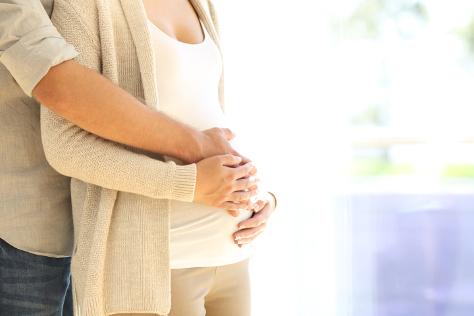First signs you feel your little one moving
Although every pregnancy is different, from around 16 weeks you may start to feel some small flutterings in your tummy (and from 18-24 weeks you should feel your baby move more and more).

And as they grow inside you, these little movements – which many mums-to-be describe as feeling like bubbles – will become stronger, forming into kicks, punches, swooshes, flips and turns, which your partner and other family members (not those randoms in the street) can feel when they touch your belly. If by 24 weeks you have never felt your baby move, you should contact your midwife.
How many times a day should I feel my baby moving and kicking?
Every single baby is different meaning there’s no set number of kicks you should be feeling. In fact baby’s movements can vary from 4 to over 100 every hour.
Instead, it’s more about knowing what’s normal for your little one.
As they become more fidgety you’ll probably start to notice a pattern and this is what you should be learning to recognise. The number of movements may increase up to around 32 weeks and then stay around the same up until and during labour.
You can read more about your baby’s movements and development with our pregnancy week by week info.
My baby hasn’t been moving as much as normal today. Should I be worried?
In most cases your little one may just be having a chill out. However you should always inform your midwife if your baby’s movements become different. This includes if they have slowed down, stopped or changed.
Don’t put off calling until the next day to see what happens. There are staff on the hospital maternity unit 24 hours a day, 7 days a week. The midwife at the unit will advise you what to do – she may ask you to come to the unit to be checked.
And importantly – don’t worry about phoning – midwives would much rather you called than were worried.
Never rely on devices at home such as hand-held monitors, Dopplers or phone apps to check your baby’s heartbeat. Even if you detect a heartbeat this doesn’t mean your baby is well and you may be falsely reassured.
It is not true that babies move less towards the end of pregnancy and you should continue to feel your baby move right up to the time you go into labour and during labour.
For more information about your baby’s movements check out the Kicks Count website.